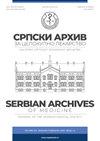Impact of COVID-19 pandemic on pre-hospital and in-hospital time-dependent performance measures of treatment of patients with acute ischemic stroke - experience of a tertiary healthcare center
IF 0.2
4区 医学
Q4 MEDICINE, GENERAL & INTERNAL
引用次数: 0
Abstract
Introduction/Objective. The outbreak of COVID-19 pandemic has posed major challenges to the process of urgent care of patients with acute ischemic stroke (AIS) that requires optimal and well-coordinated pre- and in-hospital chains in order to enable recanalization therapy commencement the earliest possible. The study?s objection was to compare time-dependent performance measures and treatment results of patients with AIS hospitalized at a tertiary healthcare center before and during COVID 19 pandemic. Methods. Retrospective analysis was performed on AIS patients treated with recanalization therapy at Emergency Neurology Department of University Clinical Centre of Serbia, during the March-June period of years 2019, 2020, and 2021. Besides demographic and clinical characteristics, for each patient were calculated: time elapsed from stroke onset to hospital arrival (?onset-to-door"), from hospitalization to the beginning of recanalization therapy (?door-to-needle") and total time that elapsed from symptoms?s onset to treatment initiation (?onset-to-needle"). Patients? functional outcome was assessed after three months by using modified Rankin scale (mRS) score. Results.Total of 84 patients were included (25/2019, 30/2020 and 29/2021; [p= 0.512]). No statistical significance was detected regarding age, gender, severity of stroke symptoms at hospital admission or type of received recanalization therapy. Our study showed no statistical difference regarding time needed to reach the hospital (p=0.441), ?door-to-needle" time (p = 0.549), nor overall times elapsed from symptoms onset to therapy (p=0.481) among three groups of patients. Furthermore, comparison of patients? three-month functional outcomes didn?t show statistical significance (p = 0.922). Conclusion: This experienced tertiary healthcare system has shown notable resilience to the side-effects of COVID-19 pandemic.COVID-19大流行对急性缺血性卒中患者院前和院内治疗时间依赖性绩效指标的影响——一家三级医疗保健中心的经验
介绍/目标。COVID-19大流行的爆发对急性缺血性卒中(AIS)患者的紧急护理过程提出了重大挑战,这需要优化和协调良好的院前和院内链,以便尽早开始再通治疗。这项研究?本研究的目的是比较COVID - 19大流行之前和期间在三级医疗保健中心住院的AIS患者的时间依赖性绩效指标和治疗结果。方法。回顾性分析了2019年、2020年和2021年3月至6月期间在塞尔维亚大学临床中心急诊神经内科接受再通治疗的AIS患者。除了人口统计学和临床特征外,还计算了每个患者的时间:从中风发作到到医院(“从发病到上门”),从住院到开始再通治疗(“从门到针”),以及从症状到总时间。从发病到开始治疗(“从发病到针头”)。病人?3个月后采用改良Rankin量表(mRS)评价功能结局。结果。共纳入84例患者(25/2019、30/2020和29/2021;[p = 0.512])。在年龄、性别、入院时卒中症状的严重程度或接受再通治疗的类型方面,没有发现统计学意义。我们的研究显示,三组患者到达医院所需的时间(p=0.441)、“门到针”的时间(p= 0.549)以及从症状出现到治疗的总时间(p=0.481)均无统计学差异。此外,患者的比较?三个月的功能结果呢?T有统计学意义(p = 0.922)。结论:这个经验丰富的三级卫生保健系统对COVID-19大流行的副作用表现出显著的抵御能力。
本文章由计算机程序翻译,如有差异,请以英文原文为准。
求助全文
约1分钟内获得全文
求助全文
来源期刊

Srpski arhiv za celokupno lekarstvo
MEDICINE, GENERAL & INTERNAL-
CiteScore
0.40
自引率
50.00%
发文量
104
审稿时长
4-8 weeks
期刊介绍:
Srpski Arhiv Za Celokupno Lekarstvo (Serbian Archives of Medicine) is the Journal of the Serbian Medical Society, founded in 1872, which publishes articles by the members of the Serbian Medical Society, subscribers, as well as members of other associations of medical and related fields. The Journal publishes: original articles, communications, case reports, review articles, current topics, articles of history of medicine, articles for practitioners, articles related to the language of medicine, articles on medical ethics (clinical ethics, publication ethics, regulatory standards in medicine), congress and scientific meeting reports, professional news, book reviews, texts for "In memory of...", i.e. In memoriam and Promemoria columns, as well as comments and letters to the Editorial Board.
All manuscripts under consideration in the Serbian Archives of Medicine may not be offered or be under consideration for publication elsewhere. Articles must not have been published elsewhere (in part or in full).
 求助内容:
求助内容: 应助结果提醒方式:
应助结果提醒方式:


